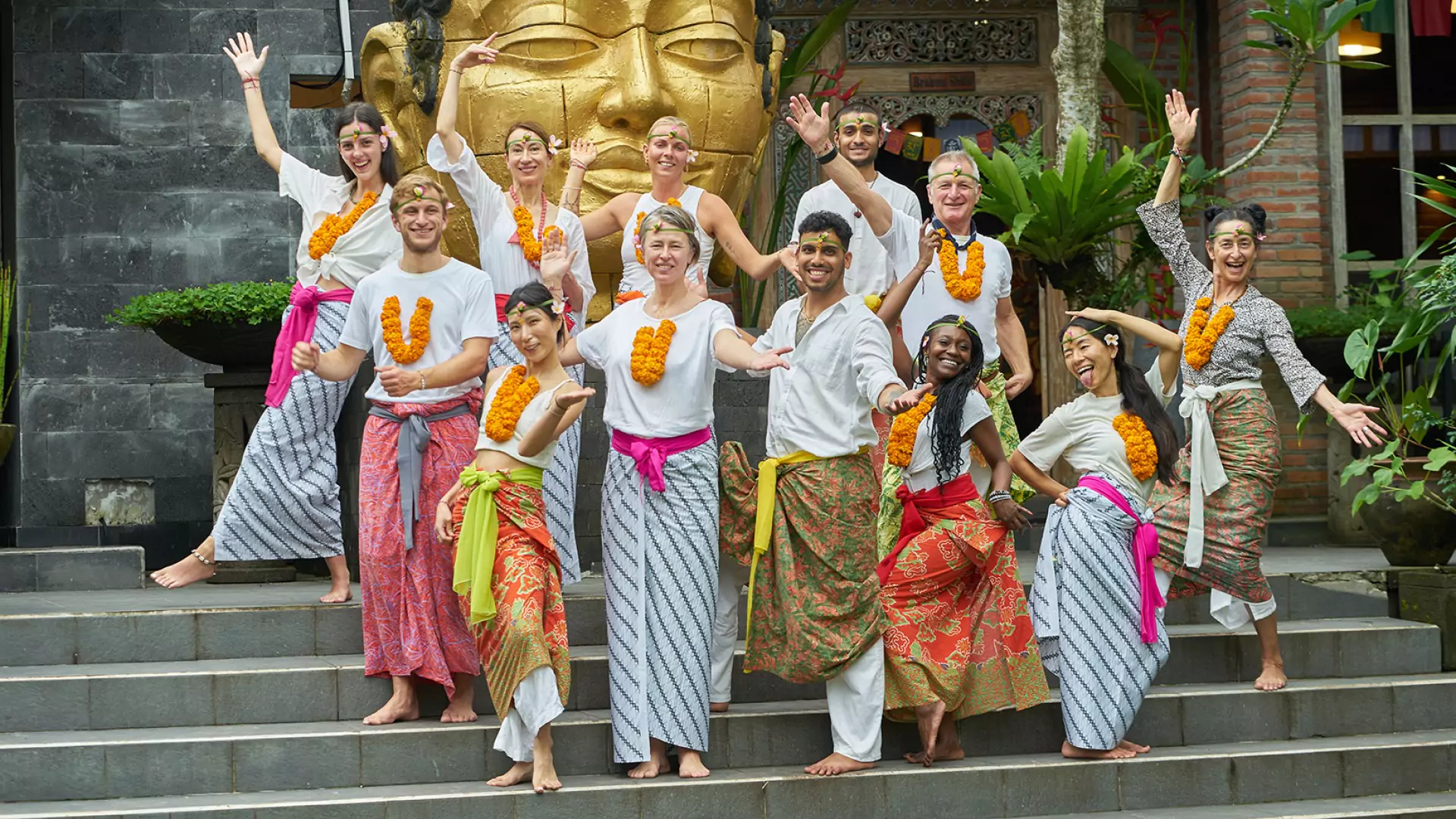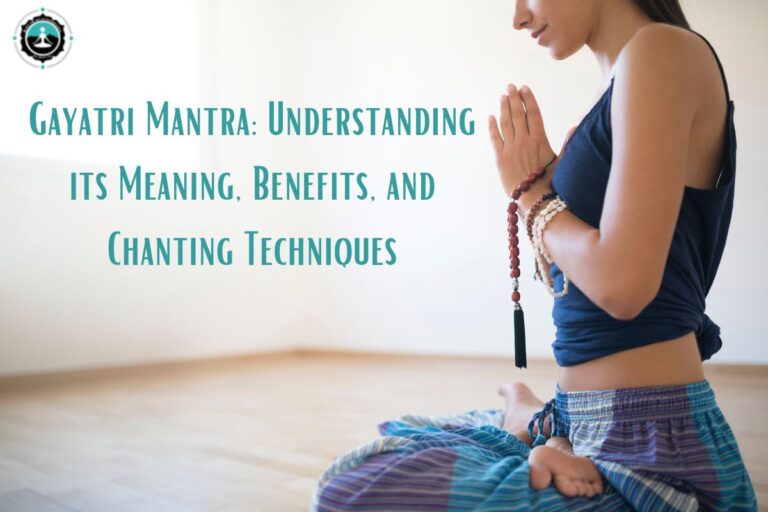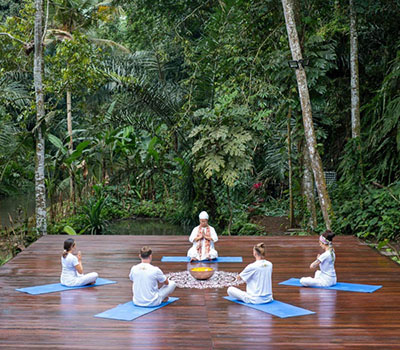Beyond Asanas: The Philosophy and Ethics Taught in Our YTTC Curriculum
Beyond the Mat: Unveiling the Ethical Compass & Philosophical Depths of Our YTTC
When I first started studying yoga, I, like many others, thought yoga was about performing difficult poses, headstands, splits, etc. Because let’s face it, stretching is good for the body.
Maybe you’re thinking about doing a yoga teacher training in Bali; maybe you want to go on a yoga teacher training retreat. Or maybe you are just curious about what actually happens in those programs.
Whatever led you here, I will tell you, there is so much more beyond the asanas! This is a journey that transforms you and not just your flexibility. Think of it like this: yoga is an expanding universe. The poses, the physical practice—that’s just the visible, the stars to see in the night sky.
Nevertheless, there is so much more tangential to this subject, unseen yet powerful. And in our Yoga Alliance Certified Course, particularly with our 300-Hour Advanced Yoga Training, we don’t merely show you how to do the pose itself; we help you begin to experience the ‘why’ behind all of it.
If your intention is to become a yoga teacher, or even if it is simply to receive a deeper understanding of yoga through an international yoga certification course, you will find that the real magic happens in the philosophy and ethics: how you can live your life, interact with your fellow humans, and ultimately how you connect with yourself.
And if this has you thinking about a yoga instructor course in Bali, or even the best yoga teacher training experience in Bali, then you will quickly discover that Bali itself has a deep, refreshing spiritual energy that expands and reinforces this work on the inside. Now, can we start to have some of those layers peeled back?
We are going to explore what makes a residential teacher training a whole lot more than working out!
The Ethical Foundation: Yamas and Niyamas
We’ve talked about the physiological, but let’s get to the heart of yoga, the stuff that really shifts you: the Yamas and Niyamas. Think of them like your personal compass, your guiding stars on this nutty journey called life. You know, when I first heard about them, I thought, ‘Great, one more list of things I have to keep track of and that influence my decision-making.’
Yamas
Ahimsa
But it’s much more than that; it is more like… tools. Ahimsa, which means non-violence, for example. Sounds easy enough; don’t hit anyone. But it goes much deeper than that. It is about being gentle with yourself, silencing that inner critic, and speaking kindly to others.
It is about understanding there is a lack of separation between anything, really. Soon you will have an understanding of how even thoughts cause waves. Especially in a place like Bali, where energy needs to be by the people around you, you really feel that connectedness. If you’re considering a yoga teacher training in Bali, I think you will soon find out that this principle resonates with their culture.
Satya
And then there is Satya, truthfulness. Now this one is a daily practice, right? Being honest with yourself even when it is uncomfortable. When you’re in a 200-Hour Yoga Teacher Training Course, which genuinely encourages you to take the time for internal reflection, you can begin to see how you have manipulated the truth, even to yourself. It’s an invitation to notice your own authenticity.
Asatya
Then we have Asteya, which translates to non-stealing.” It is not only about stealing physical objects. It is about honoring and respecting the time of other human beings, the vitality of other human beings, and the ideas and talents of other individuals. It is about robbing and stealing moments, taking things for granted. When you’re providing yoga teacher training in a residential setting, you have the opportunity to release on these moments.
Brahmacharya
Brahmacharya, or moderation, is not solely about celibacy…as we commonly think about. It’s about moderation in everything we do: food, work, relationships, screen time, everything!!! When you undergo residential yoga teacher training, it requires you to learn how to moderate your life when going through the experience of becoming a certified yoga teacher.
Aparigraha
And lastly, you have Aparigraha, which translates to non-possiveness. This means to not cling to things, outcomes, or people. To trust in the flow of life. I see in a 300-hour advanced training, we begin to give up expectations and start to experience the moment.
Niyamas
Next, the Niyamas are a reflection of the positive actions we take.
- Saucha, or purity, means keeping your mind and body clean.
- Santosha, or contentment, is about finding joy where you are, right now. T
- Apas, or self-discipline, is about turning up for yourself even when you don’t want to.
- Svadhyaya, or self-study, is about going deep within yourself, and
- Ishvara Pranidhana, or surrender, is about trusting that there is something bigger than yourself.
At the Yoga Alliance-certified course, especially if you want the best yoga teacher training in Bali, we don’t just talk about them. We love them. We practice them. We trip over ourselves, we learn, we grow together.
Because honestly, they are not just for the mat; they are for life. If you are looking for an international yoga certification course, you’ll come to find these principles are all the same no matter where you live. It doesn’t really matter where you’re from.
So, yes, the Yamas and Niyamas. They’re like your ethical toolkit. They help you navigate your world with a little more kindness, a little more awareness, and a little more peace.
And if you’re doing a yoga instructor course in Bali or an intensive yoga teacher training retreat, you’ll have the space to really let these principles sink in.
And if you’re doing a yoga instructor course in Bali or an intensive yoga teacher training retreat, you’ll have the space to really let these principles sink in.
The Philosophical Depths: Exploring Yoga Sutras and Beyond
Alright, so we’ve discussed the ethical framework, which is the ‘how’ we live; now let’s move on to the ‘why.’ This will include the philosophy, and trust me, this will be a bit of a rabbit hole, but in the best way possible.
Yoga Sutras
Truly think of it like we’re unearthing some ancient wisdom now that has ritualistically been passed down through centuries. Patanjali’s Yoga Sutras? Man, they are the original guides of yoga. They are not just guidebooks to a particular set of ‘poses’; it’s a form of understanding the mind and the consciousness and how to find inner peace.
During a 200-hour yoga teacher training course, you’ll spend some time diving into these sutras; you could almost consider that experience akin to reading a map of your inner intuition experience. You know the eight limbs of yoga? This isn’t just some modern concept but serves as a practical guide.
You start to notice how the asanas, the physical poses, are just one slice of the parade. There’s breathwork, meditation, self-offering, and finally a connection to something larger and beyond us. And if you want to know how to teach yoga, those are the parts you want to know the most as an instructor.
Bhagavad Gita and the Upanishads
But it doesn’t end with the Sutras. In our 300-Hour Advanced Yoga Training, we look at many other texts such as the Bhagavad Gita and the Upanishads. They bring in more layers of understanding, more angles to consider when looking at the same mountain—they are about seeing how everything is interconnected, the expression of energy and consciousness.
Samskaras
And then you get to exploring things such as Samskaras; that is how our habitual mental imprints show up in our habits and patterns. Those things that keep us locked into the same habitual loops? Understanding samskaras is like finding the keys to unlock yourself. And if you have the chance to take yoga teacher training in Bali, you have found the right place to do this deep inner work.
Gunas
And what we call the Gunas (the 3 qualities of nature)—sattva, rajas, and tamas—are all part of this exploration. Being able to notice how these qualities are present in our lives and how they impact our moods, choices, and energy levels. Only then can we decide how we can bring more balance into our lives. Which, as referred to before, is a huge piece to consider if you are in search of the best yoga teacher training in Bali.
A study internally
To be honest, to study this philosophy is not to study intellectually. It is a personal transformation. You begin to see who you are and the world in a fundamentally different way. It’s like you took off a pair of foggy glasses you didn’t even know you were wearing. And if that’s something you’re seeking in an international yoga teacher training program, this study needs to happen.
And let’s be real, an opportunity for an in-depth study to unravel these teachings will be in a residential yoga teacher training program or intensive yoga teacher training retreat, where you will have the time and space to let these teachings sink into your system.
It is a journey inwards, and it’s a journey that will change you. If you consider studying for a yoga instructor course in Bali or yoga teacher training in Bali, you will experience this yourself.
Ethical Teaching: Responsibility and Integrity
You have taken in all of that knowledge, you have begun to appreciate the philosophical possibilities, and you feel the urge to share it with others. This is the philosophy of ethical teaching, and it is a big deal. It includes gracefulness, integrity, and a big heaping of respect.
You know the teacher-student relationship? It is holy. You are creating a safe and inclusive space for everyone to be seen and heard. You also are understanding the power dynamics in playing with the awareness of being a guide versus a guru. If you are even contemplating a yoga teacher training program, you will learn what a big deal this is pretty quickly.
Especially if you are doing a 200-Hour Yoga Certifying Course, you will start to understand what it means to create a safe space for students. That your words, touch, energy, etc. all hold value and weight. If you are looking for the best yoga teacher training in Bali, then we will teach you to be responsible and respectful.
Yoga: The Course to Be Respected
Let’s address cultural appropriation, as it’s something to consider. Yoga is a gift from ancient India, and you have a responsibility to honor its origins, to teach it accurately, and not to turn it into something it is not. It is a matter of being well-educated, respectful, and acknowledging the lineage. This is important if you want an international yoga certification course.
And as teachers, we are constantly learning. We are always growing. It is about continuing education, self-study, and being open to having your perspective changed. If you are going on a 300-Hour Advanced Yoga Training, then you will learn that the learning never stops.
Utilization of Digital Media
And then there is the social media thing. Social media has power and an ethical responsibility that comes with having that power. If you have a public social media account, it’s being aware of how you present yourself, how you represent yoga, and how you engage with your followers. If you are doing a yoga teacher training in Bali, you will learn how to navigate this space with grace.
Think about practical examples.
- What do you do when a student tells you they are sharing something personal?
- What do you do when you have a student who is testing out their physical limits?
- How do you respond to a student who is dealing with mental health?
These are the types of questions we consider in our programs. And if you are doing a residential yoga teacher training program, you will have the time to think about these questions. It‘s a question of teaching from a place of heart, integrity, and a sense of responsibility.
It’s a realization that you are not simply teaching poses to people; you are guiding people on a journey of self-discovery. And if you are doing an intensive yoga teacher training retreat, you will have a lot of space to think about these ethics. Or if you are planning to do a yoga instructor course in Bali, you will find that the island will motivate you to teach with integrity.
The Core: Living Yoga as a Way of Life
We have discussed ethics, philosophy, and responsibilities of being a teacher, but remember, it ultimately comes back to how you live your life. It’s about living your yoga, not just on the mat, but in your everyday life. Think in terms of living holistically.
Holistic Living
Living holistically is bringing mindfulness and compassion into everything you do—your day, your meals, your choices, your movements, your thoughts, and others. Yoga is not just something you do; yoga is something you are. If you become a certified yoga teacher, you will learn it is a lifestyle.
Yogic Diet
And as a side note, you may be thinking about that yogic diet? You will not hear about strict rules or deprivation. You will hear about feeding your body with healthy, vibrant foods to help support your practice and nourish your body and well-being. Noticing what you are feeding your body, recognizing that food is medicine that fuels your energy and mood. If you are in a 200-hour yoga teacher training course, you will learn about a yogic diet.
Yogic Community
It’s also about community. Yoga is a practice that connects us beyond just ourselves, into one another. It is building a system of unique support for one another, where we share and grow together. If you are seeking the best yoga teacher training in Bali, you will find a community here.
The Seva
And don’t forget seva, selfless service. It is to give, to contribute to something bigger than yourself, and the awareness that we are all part of the web of interconnected life. If you are doing a 300-Hour Advanced Yoga Training, you will learn more about the importance of seva.
Honestly, living yoga as a lifestyle — it’s a journey, not a destination — living it is to always be changing, growing, and learning. It’s to experience the highs, lows, challenges, and successes and recognize that every moment is an opportunity to practice yoga. If you take a yoga teacher training in Bali, you are sure to learn how to practice yoga in everyday life.
Conclusion: The Journey Inward
So, we have traveled together, not just to learn about the layers of yoga that exist beyond the postures, but we have also discussed the moral compass of the Yamas and Niyamas, the philosophical layers involved in the Sutras and beyond, the obligations and considerations of teaching, and most importantly, what it is to live yoga as a lifestyle choice. It is understanding that yoga is not just something you do; it is something you are.
You embody mindfulness, awareness, compassion, and integrity in all aspects of your life, and if you are considering a yoga teacher training in Bali or on any path you take that has you become a certified yoga teacher, just know that you are taking a journey inward, a journey of self-reflection.
This is not an easy task. A challenge and profound shift will take place, in addition to causing respite. However, the gifts you will receive are immeasurable. It is finding you rest in mindful peace, in each and every one of those very incredible moments, that they connect, become greater than you, and bring the meaning of life as you interpret it to fruition over and over again.
And to put an exclamation point on that, here is a reminder that true yoga occurs off the mat, in those moments of daily life: “Yoga is not about touching your toes; it is what you learn on the way down.
So as you might find yourself on this journey, breathe, be present, and enjoy the ride. If you seek the best yoga teacher training in Bali or want to take an international yoga certification course, then may you find this path leads you home to yourself.






